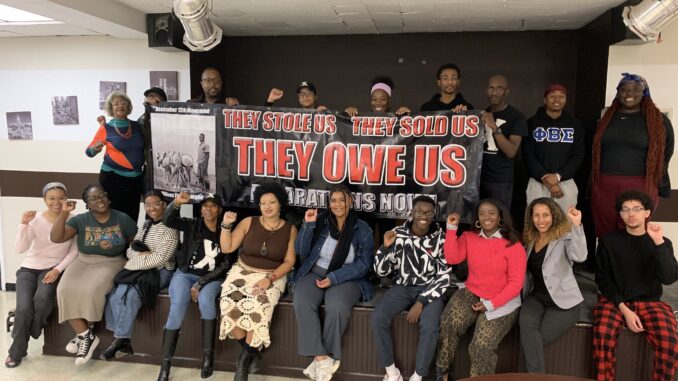
By Vanessa Cruz
“They Stole Us, They Sold Us, They Owe Us: Reparations Now!” This is the motto of the Black human rights organization, the “December 12th Movement.” On Tuesday, Oct. 29, the Black Solidarity Day Committee in coordination with the December 12th Movement, held a pre-Black Solidarity Day event in collaboration with the Black History Month Committee (BHMC), Black Faculty and Staff (BFS), and the Black and Latino Male Initiative (BLMI).
Black Solidarity Day takes place on the Monday before Election Day in November and is a national day of awareness and unity for Black people in the United States. It was founded by former Brooklyn College professor Carlos E. Russell in 1969. The event illustrated what the speakers described as the historical and current global struggle for reparations. Topics included a demand for a federal executive order downpayment for reparations, the historic “Durban Declaration” that launched the current reparations movement, and a call for students to get involved in what they called a “centuries-long grassroots struggle.”
“Our idea of reparation is one in which capitalism must suffer as a result, based on the debt that it owes,” said BC professor of sociology and faculty advisor Lawrence Johnson.
Following Johnson’s introduction was December 12th Movement member Roger Wareham. Wareham has been a lawyer and political activist advocating for human rights for people of color since 1989. As part of his advocacy, he and December 12th Movement members Linda Roots and Nzingha Robinson, led 400 activists to Durban, South Africa, to establish the Durban Declaration, which propelled the international struggle for reparations. It recognizes the Trans-Atlantic Slave Trade as a crime against humanity, the roots of slavery and racism as economic, and the establishment of reparations as something owed to descendants of the victims who experienced these historic injustices.
“African people in the United States have to take our issue outside of the confining legal, geographical boundaries of [the U.S.] and take it before the international rear,” said Wareham. “So we see the issue of reparations, both locally, nationally and internationally.”
One theme surrounding the conversation of reparations was the unity for both the demands and who the demands are being made for. “We think we’re the only ones that suffered, but people were dropped off in [many] different places,” Roots said. “So when we think of reparations, yes, you can do a calculation on labor, but there are other calculations to be done.” According to the Movement, part of moving forward now is rallying for a federal executive order that undertakes reparations.
“A lot of the times when we hear these politicians talk about voting, they make an emphasis on the Black vote and the importance of having Black people,” said student speaker Jordan Martin. “Our understanding is that our hope needs to be turned. It shouldn’t just be asked for and given up.”
Fellow student speaker Ariana Baldwin asked the audience, “When you all think of reparations, what immediately comes to mind?” to which many attendees shouted out money.
“They see us as a monolith,” responded Baldwin. “So that’s why the treatment has to be for the Black community as a whole […] Our approach is community-centered. It is not individual.”
As part of the December 12th Movement, Martin and Baldwin proposed that the president sign an executive order at a federal level for a $50 billion down payment toward reparations, citing it as just the beginning. In part of their proposal, they alluded to the U.S.’s support of Ukraine and Israel, which has surpassed the $50 billion proposed down payment.
“It’s kind of like this thing, they got money for wars, but they don’t got money for health care,” Baldwin said. “It starts at health care, but it doesn’t end there: $50 billion down payment towards educational facilities, towards cultural institutions, towards job initiatives, and trainings for our youth in the community.”
To organizers of the event, reparations is just the beginning of what is needed to repair generations of inequality for Black Americans and those throughout the African Diaspora.
“We’re not begging for it,” guest speaker Nzingha Robinson said. “You owe it to us. This is ours.”
Students interested in learning more about Black Solidarity Day and upcoming events can follow the committee on Instagram @blacksolidaritydaycommittee_bc
